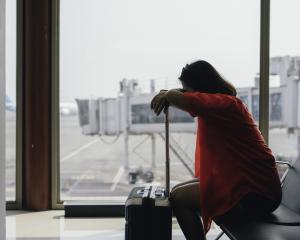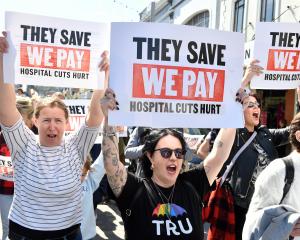
It started well enough. We were directed to our seats — a small chair for me and a mushroom (not of the magic variety) for my daughter-in-law. The chef/cafe owner (4) elaborately outlined the menu on plastic stencil sheets.

When I asked for water, mine host could only provide one cup which we were told we had to share.
After a considerable wait, my companion was presented with what appeared to be a hard-boiled egg (the chef must have heard about the salmonella egg scare up north). When she asked what had happened to the other items she was promised, the chef/owner said too many other people had ordered them so she couldn’t have them.
After he retired several times to count the cafe takings (he had insisted we pay in advance) I was eventually presented with some chips (aka coloured pencils). When I requested tomato sauce, the red pencil was retrieved and pressed into service to draw some.
By this time, the waiter (1) had gone rogue, running amok with our only knife (wooden, fortunately), and snatching some of my chips because he had seen me attempting to eat them.
Dessert would have to be better, surely. No. Yes, we have no bananas was the story (though he didn’t know the song) because they were en route from Dunedin. That may have been the case for the ice cream too, but hunger has rendered my memory blank on that point.
When my companion complained about the slowness of the service, our host’s baffling response was that you wait a long time for food in Dunedin cafes.
We might have avoided this entertaining if unfulfilling experience if he had followed the plans of some Auckland bar and cafe owners and insisted on us being fully vaccinated against Covid-19 before entry — we are both only singly jabbed.
These businesses are suggesting that in a month’s time they will have a no-vax, no-entry policy and will be asking wannabe customers to produce their Covid-19 vaccination cards before they get in.
This action seems over the top, not just because those vaccination cards seem easy to falsify.
The requirement for vaccination proof for international travel has precedent and is unlikely to be controversial. But we know little about how these might be used domestically.
The possible introduction of these raises many issues, including how far their reach might extend.
Even if use was confined to bars, sports events, nightclubs, and other entertainment venues, they seem questionable.
Double-vaccination, while protecting most people from becoming severely ill if they are unlucky enough to encounter the disease, is not a guarantee that the vaccinated person cannot pass on Covid-19.
In common with any vaccine, there will also be a small percentage of non-responders, people who have received their vaccinations, but their systems have not produced an immune response.
When the vaccination provokes the desired response, its long-term efficacy is not clear. Over time, and who knows exactly for every person what that time might be, the effectiveness of the vaccine may wane and a vaccinated person with a break-through infection, and possibly without symptoms, could spread the illness.
So, without knowing who among the vaccinated might be capable of transmitting the disease, or their actual level of protection, couldn’t allowing only the vaccinated to enter lull everybody into a false sense of security?
Is this fair and sensible?
If the vaccination passport used for international travel is what would be used domestically, would the Government police its use or allow a free-for-all? What protection from function-creep into some sort of much wider form of ID would there be? Where would this sit with health information privacy?
Old Luddites like me without Smartphones would need a suitable alternative too. Given the Government’s failure to introduce proper privacy controls for paper contact tracing records (most businesses I have visited lately still have lists visible to all and sundry) in more than a year, would it be capable of getting a paper form of this right?
In the meantime, the United Kingdom has stepped back from introducing vaccination passports for entry into nightclubs and big events. Some have suggested the threat of it had the desired effect of boosting the vaccination rate in young adults.
Here, there needs to be a serious wide-ranging public consultation about all the issues around the use of any type of vaccination passport domestically, including what it might be expected to achieve.
At this point, I would need some convincing of its promise and delivery.
- Elspeth McLean is a Dunedin writer.












